Baker Academic Biblical Greek Collection (6 vols.)
Digital Logos Edition
Overview
The Baker Academic Biblical Greek Collection contains the finest resources for beginning New Testament Greek students. This collection presents six volumes on Greek grammar, syntax, linguistics, and exegesis. It introduces basic linguistic concepts and provides a comprehensive survey of Greek nouns, verbs, and clauses. Two volumes teach grammatical concepts in Greek by first illustrating how they work in English grammar. The collection includes numerous exercises, word guides, reviews, and grammatical discussions. If you’re a pastor, linguist, or first-year Greek student, this collection will help you expand and grow your understanding of the complexities of the Greek language.
With the Logos edition, you get easy access to Scripture texts and to a wealth of other resources in your digital library. Hovering over Scripture references links you instantly to the verse you’re looking for, and with Word Studies, Bible Senses, and a wealth of other tools from Logos, you can delve into Greek like never before!
This title is included in the following collections
You can save when you purchase this product as part of a collection.
Baker Ultimate Collection 2022...
$38,273.89$30,599.99

- Contains contributions from key Greek and New Testament scholars
- Uses English grammar to make Greek grammar easier to understand
- Provides practical examples, reviews, discussions, and exercises
- Title: Baker Academic Biblical Greek Collection
- Volumes: 6
- Pages: 1,284
- Christian Group: Evangelical
- Resource Type: Handbooks
- Topic: Language and Interpretation
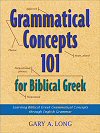
Voice, tense, mood, participles. Learning biblical Greek is tough enough with a firm grasp of the building blocks of English and daunting to those without. But that’s just where many first-year students are. Through many years in the classroom, veteran language instructor Gary Long has learned that it’s in the first semester that many students get bogged down in grammatical basics. Soon confidence, morale—and then grades—start to slip.
A growing number of students have forgotten, or never learned, the fundamental grammatical concepts needed for studying Biblical Greek. Explanations of these concepts in standard Greek textbooks are either too skimpy or too complex. This practical resource will help.
Written for learners with little or no formal study of grammar, this invaluable complement to standard classroom textbooks clarifies English grammar in order to more effectively teach concepts that are specific to New Testament Greek. Arranged to supplement teaching grammars, each chapter takes up individual concepts, first explaining how the concept works in English, then illustrating its use in biblical Greek.
Abundant English and Greek examples illustrate each concept, most of them visually analyzed. Glossaries and translations help students comprehend the Greek words in each example.
Gary Long has written a book on a topic that most people would prefer to avoid. We all know that grammar is ‘good for us,’ but we cringe at the prospect at having to relearn everything we learned (or were supposed to learn) in grade school. Add to that the study of a second language—and one as challenging as New Testament Greek—and you have a recipe for disaster. Enter Grammatical Concepts 101 for Biblical Greek. I rate this book as four stars (out of five) because it almost achieves the impossible—it makes grammar as painless as possible. I will definitely recommend it as a reference tool to my Greek students. If anyone wants a concise, easy-to-understand definition of any given part of speech (both in Greek and English), it’s all here!
—David Alan Black, professor of New Testament, Southeastern Baptist Theological Seminary
The author of this work is a veteran teacher of biblical Greek and he notes that often students are learning ‘two’ languages at once—the Greek itself and the grammar of their native language, English, which is often poorly understood. The purpose of this resource is to help beginning Greek students make the connections between the familiar grammatical concepts and structures of their native language and the distinctive features of biblical Greek. . . . Those who teach biblical Greek may find this a helpful resource to consider.
—The Bible Today
This book could and should be used with good effect as a supplement for Greek beginners. It would add value to most existing text books.
—Review of Biblical Literature
Those who have used Gary Long’s previous book on Hebrew will recognize immediately the format employed again with this volume. It is not a teach yourself grammar but an introduction to biblical Greek using English grammar. This has the advantage of reinforcing English grammar first, and then presenting the Greek. Many diagrams and charts help and students studying by themselves or in class will find this a very useful adjunct to other grammars.
—Reformed Theological Review
In order to get a fuller understanding of biblical Greek, a general understanding of grammatical concepts in necessary. To increase grammatical consciousness, the present book offers a thorough introduction.
—International Review of Biblical Studies
Gary A. Long (PhD, University of Chicago) is professor of biblical and theological studies at Bethel University in St. Paul, Minnesota. He is also the author of Grammatical Concepts 101 for Biblical Hebrew.
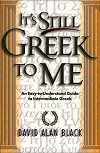
According to David Alan Black, people who teach or write about Greek grammar tend to treat the subject as though it were a green vegetable: “you may not like grammar, but it’s good for you.” It’s Still Greek to Me offers an alternative approach.
“I have tried to organize the book in a manner geared to the way people actually use the language, and I have done my utmost to make this book not only accurate but easy to understand and enjoyable to read,” Black explains. “I have tried, in short, to produce a true user’s guide to New Testament Greek for the twenty-first century. The only prerequisites on your part are a basic knowledge of Greek—and a healthy sense of humor.”
Like other intermediate grammars, It’s Still Greek to Me provides a comprehensive survey of Greek syntax with chapters devoted to the nuances of Greek nouns, verbs, and clauses. Unlike other grammars, this one also takes students on a brief refresher tour of English grammar.
It’s Still Greek to Me is intended primarily for those who have finished one year of instruction in Greek and is thus best suited for second-year Greek classes or seminary exegesis courses. Its 13 chapters can easily be covered in a one-semester course, with ample time for review and testing. Each chapter concludes with practice exercises and key terms for review.
Throughout my years of teaching intermediate Greek grammar, I have used a variety of textbooks, none entirely satisfactory. In our age of widespread linguistic illiteracy, what is needed is a relatively short, succinct grammar with clear explanations and without unnecessary multiplication of categories. The text should probably review comparable basics of English grammar and regularly use abundant New Testament examples to ‘hype’ the relevance of each topic. If it is self-effacing with a fun sense of humor, so much the better. David Black has done all of this! I will adopt the book as a required text for my second-year Greek students immediately.
—Craig L. Blomberg, distinguished professor of New Testament, Denver Seminary
David Black’s It’s Still Greek to Me takes the mystery out of the syntax of the Greek New Testament. It is clearly written and cleanly presented and includes a helpful discussion of the basics of English grammar, ignorance of which often gets in the way of learning New Testament Greek. For those seeking to learn Greek or teaching it at a basic level, I can guarantee that Greek won’t still be Greek to you after using this book!
—Darrell L. Bock senior research professor of New Testament studies, Dallas Theological Seminary
David Black is clearly a master teacher. His work is practical and easy to understand. The author is conversant with the latest research on Greek grammar. Students will rejoice to find a grammar that is both comprehensible and accurate.
—Thomas R. Schreiner, James Buchanan Harrison Professor of New Testament Interpretation, The Southern Baptist Theological Seminary
Out of many attempts to make Greek grammar clear and interesting (even entertaining!), David Black’s book, It’s Still Greek to Me, is probably the most successful. Although the author does not break from the traditional approach, there is a freshness to the presentation that will encourage disheartened students. This guide should prove especially appealing to ministers who need a refresher course.
—Moisés Silva, emeritus professor, Gordon-Conwell Theological Seminary
A clearly written and clearly presented brief review of the basics of New Testament Greek grammar. . . . The design of the layout is both pedagogically helpful and visually appealing. Examples are numerous, and exercises (for which a key is included) are short.
—Religious Studies Review
David Alan Black (DTheol, University of Basel) is professor of New Testament at Southeastern Baptist Theological Seminary. He is the author of numerous books, including Learn to Read New Testament Greek and Interpreting the New Testament.
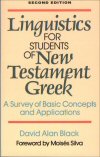
This volume introduces Greek students to the field of linguistics and shows how its findings can increase their understanding of the New Testament. “Curiosity about linguistics and its place in the study of Greek is now too great to be satisfied by the handful of specialized studies written mostly for experts,” observes Black. Hence Linguistics for Students of New Testament Greek includes a new chapter on discourse analysis.
In producing this first-class practical introduction to the complexities of New Testament Greek, Black has succeeded in making sense of the many arbitrary rules of old-fashioned textbooks, and has shown how the insights of linguistics can make the learning of Greek not only much easier but also more thorough and systematic.
—Eugene A. Nida, former executive secretary for translations, American Bible Society
To be properly prepared for the tidal waves of change that must inevitable make obsolete so much of what we take for granted in grammatical and lexical study, one must also take time out to read and inwardly digest Linguistics for Students of New Testament Greek. . . . No intimidation here. Anyone who can read an editorial page can understand this book, and the synchronic emphasis will cure almost any case of overexposure to diachronic presentation.
—Frederick Danker, emeritus professor, Lutheran School of Theology
David Alan Black (DTheol, University of Basel) is professor of New Testament at Southeastern Baptist Theological Seminary. He is the author of numerous books, including Learn to Read New Testament Greek and Interpreting the New Testament.
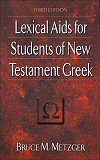
The beginning Greek student soon faces a vexing dilemma: a myriad of vocabulary words to learn and little time to learn them. One of the century’s leading Greek scholars offers a solid solution by organizing Greek words according to their frequency of appearance in the New Testament. Lexical Aids for Students of New Testament Greek helps students maximize their study by concentrating on the words that appear most often in the Greek New Testament.
This venerable resource, which has served beginning language students for over 50 years, is divided into two parts. Part one lists New Testament words according to their frequency of occurrence. The usefulness of such lists is obvious, writes Metzger. By consulting them the beginner will not, so to speak, waste his time memorizing words that occur only rarely in the New Testament. He can be assured that when he has learned, say, the first 513 words in the lists he then knows all of the words (other than proper names) that occur at least 25 times in the New Testament.
The second part of Lexical Aids for Students of New Testament Greek features another helpful list, grouping Greek words according to their root. Also included are appendixes that provide tools for learning Greek prepositions and the principal parts of verbs.
. . . An approach to the vocabulary of the New Testament that immediately commends itself to the student. . . should be welcomed by all—students and teachers alike—who recognize the importance of having a sound working knowledge of the language in which the New Testament was originally written. A mastery of the material in this slender volume will enable anyone who has already worked through a basic Greek grammar to read the New Testament with far greater fluency.
—Vox Reformata
An indispensable aid for beginning Greek students, strongly recommended as a supplement to a standard Greek grammar for any introductory-level seminary course in biblical Greek.
—Ashland Theological Journal
Bruce Manning Metzger (1914–2007) was the George L. Collord Professor of New Testament Language and Literature Emeritus at Princeton Theological Seminary. He was the author of hundreds of articles on Bible translation, textual criticism, the Hebrew Bible, the Apocrypha, and the New Testament. He published numerous books, including The New Testament: Its Background, Growth, and Content, The Text of the New Testament, Manuscripts of the Greek Bible, A Textual Commentary on the Greek New Testament, and The Canon of the New Testament. He was the general editor of the New Testament Tools and Studies series, The Reader’s Digest Bible, and The Oxford Companion to the Bible and was on the editorial boards of the International Greek New Testament Project, the United Bible Societies’ Greek New Testament, the Revised Standard Version of the Bible, and the New Revised Standard Version of the Bible. He served as president of the Society of Biblical Literature and the Studiorum Novi Testamenti Societas, making valuable contributions to the areas of textual criticism, philology, paleography, and translation, and was ordained in the Presbyterian Church (USA).
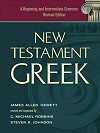
For over 20 years, first-year Greek students have relied on James Allen Hewett’s New Testament Greek: A Beginning and Intermediate Grammar for its straightforward approach to the fundamentals of language study. Now completely revised and updated, this trusted grammar will provide a new generation of beginning scholars with a solid foundation for doing translation, exegesis, and biblical interpretation.
New Testament Greek clearly presents complex Greek grammatical concepts in terms of familiar English grammar. Each concept is then illustrated using multiple examples from the New Testament, and students apply their learning with translation exercises drawn directly from biblical text instead of artificial sentences created by grammarians.
Features include:
- New chapters providing a foundational understanding of the basic components of language
- A linguistically informed chapter on how languages communicate meaning
- Detailed explanations of complex grammatical constructions that shed light on biblical meanings
- Grammatical discussions that reflect recent advances in the understanding of Greek tense and case
- Vocabulary study lists based on NT word frequency
- Greek-to-English translation exercises that help students quickly build competency and confidence
- Optional “Step Beyond” advanced grammar sections and English-to-Greek translation exercises
- Expanded reference appendixes, including summary word charts, vocabulary lists, and a list of principal parts of common verbs
- A dictionary of all the Greek words used in the text
This revision is one of the better grammars of New Testament Greek on the market. . . . The material presented is comprehensive in scope and much more detailed than other grammars. . . . Each chapter ends with an abundance of translation exercises, many drawn from the New Testament, to give students practice in using the grammatical concepts introduced in the current and preceding chapters. . . . This revision of Hewett’s grammar contains some important new features. There are additional tables, charts, and examples, including the addition of a table of abbreviations at the beginning of the book. There is a greatly expanded use of Scripture verses as examples. This is an important feature lacking in many introductory grammars. . . . The most notable additions are the two new introductory chapters that precede the chapter on the alphabet. . . . An admirable work that would make a good text for a New Testament Greek course.
—Review of Biblical Literature
Teachers of New Testament Greek may want to consider this new text. Two professor colleagues of the original author Hewett, C. Michael Robbins and Steven R. Johnson, have provided a thoroughly revised and expanded version of his introductory textbook on New Testament Greek, first published in 1986. The authors take a classic and thorough approach, leading the student reader through the various components of grammar, the mysteries of the alphabet, and then step-by-step acquaintance with the necessary forms and structures of the language—all the while building vocabulary.
—The Bible Today
Linguists, biblical scholars, and students of religious studies have varying motives for learning Koine Greek; however, all will benefit from James Allen Hewett’s New Testament Greek. This text, revised and expanded from his 1986 edition with the assistance of C. Michael Robbins and Steven R. Johnson, addresses the changing needs of today’s students and recent discussions regarding Greek grammar. While most grammars are traditionally written for classroom use, this text can be used by the self-motivating individual who wants to learn Koine. The three introductory chapters of this 25-chapter text contain two completely new sections that provide basic background and learning tools enabling students to begin language study, such as extensive grammar background, meaning, orthography, and alphabet. Each chapter focuses on a grammar component. . . . Examples and exercises utilize scripture passages. Five appendixes contain complete declension and conjugation tables, Greek to English vocabulary, English to Greek vocabulary, and principal parts of common verbs. An index of subjects and an index of scripture and Greek literature used in the text are included. Unlocking the key of any sacred text is challenging. When the sacred text is in a foreign language the reader either accepts translations or embarks upon learning the language. Hewett’s well-written and easy-to-use grammar enables the reader to undertake the latter. Public, academic, and theological libraries should have this title on their shelves.
—Libraries Unlimited
The book has many good features: the authors recognize that words have areas of meaning and transferred uses, incorporating this insight into vocabularies and the key to exercises. A variety of elements is introduced in most chapters rather than a single grammatical figure, and syntax is presented sensitively as the student progresses. Students are made aware of -mi verbs early on rather than finding them a nasty shock at the end; good use is made of New Testament phrases and sentences in the exercises. Accents are introduced gradually. . . . I would . . . recommend this book for able students and those with previous linguistic experience.
—Journal for the Study of the New Testament
James Allen Hewett (PhD, University of Manchester), a pastor with a strong background in language education, has taught Greek at Uganda Christian University, Oral Roberts University, and Asbury Theological Seminary.
C. Michael Robbins (PhD, Claremont Graduate University) is an adjunct professor in the School of Theology at Azusa Pacific University.
Steven R. Johnson (PhD, Claremont Graduate University) is professor of religion at Lycoming College.
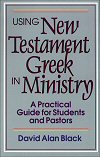
Here are all the tools pastors and teachers need to mine the Greek text and other language resources for the enhancement of personal study and sermon content. Using New Testament Greek in Ministry focuses on the transformation of exegesis into exposition, of studies into sermons. To prepare students toward this end, David Alan Black explains the process of using the Greek text and linguistic resources to study the New Testament and he recommends useful reference books for further study.
Black provides an excellent guide into the challenging realm of Greek exegesis for those who wish to preach sermons faithful to the biblical text. He is particularly helpful in bridging the gap between theoretical knowledge and the concrete sermon. Those who follow the instructions provided here will revitalize their preaching ministries. Here is a book for the many flagging pulpits in our churches.
—Donald A. Hagner, George Eldon Ladd Professor of New Testament, Fuller Theological Seminary
As I teach Greek to students preparing for ministry, I have to primary objectives of virtually equal importance: to give them adequate skills to exegete the New Testament and to mount a propaganda campaign on the relevance of Greek for preaching and teaching. For the latter objective I have been left almost entirely to my own powers of persuasion. Now Black’s book fills this gap. I intend to make it a mandatory textbook.
—Craig L. Blomberg, distinguished professor of New Testament, Denver Seminary
An unusually clear and balanced presentation, certain to be of help to ministers. Combines level-headed advice with concrete recommendations for the use of tools.
—Moisés Silva, emeritus professor, Gordon-Conwell Theological Seminary
David Alan Black (DTheol, University of Basel) is professor of New Testament at Southeastern Baptist Theological Seminary. He is the author of numerous books, including Learn to Read New Testament Greek and Interpreting the New Testament.
Reviews
10 ratings
Curtis Dubreuil
1/2/2024
Anthony Sims
9/5/2015
Jinwoo Lee
12/1/2014
Daniel M. Mandery
11/21/2014

Matt Dabbs
11/21/2013
This collection is a great way to learn or brush up on your Koine Greek. It has been seven years since I was taught Greek on the graduate level and this was a great refresher for me. You can read a more in depth review here -Curtis Dubreuil
10/15/2013

David Anderson
10/11/2013

Dr. Ivan Ramirez
9/8/2013

Clifford B. Kvidahl
8/27/2013

Cheryl
8/20/2013